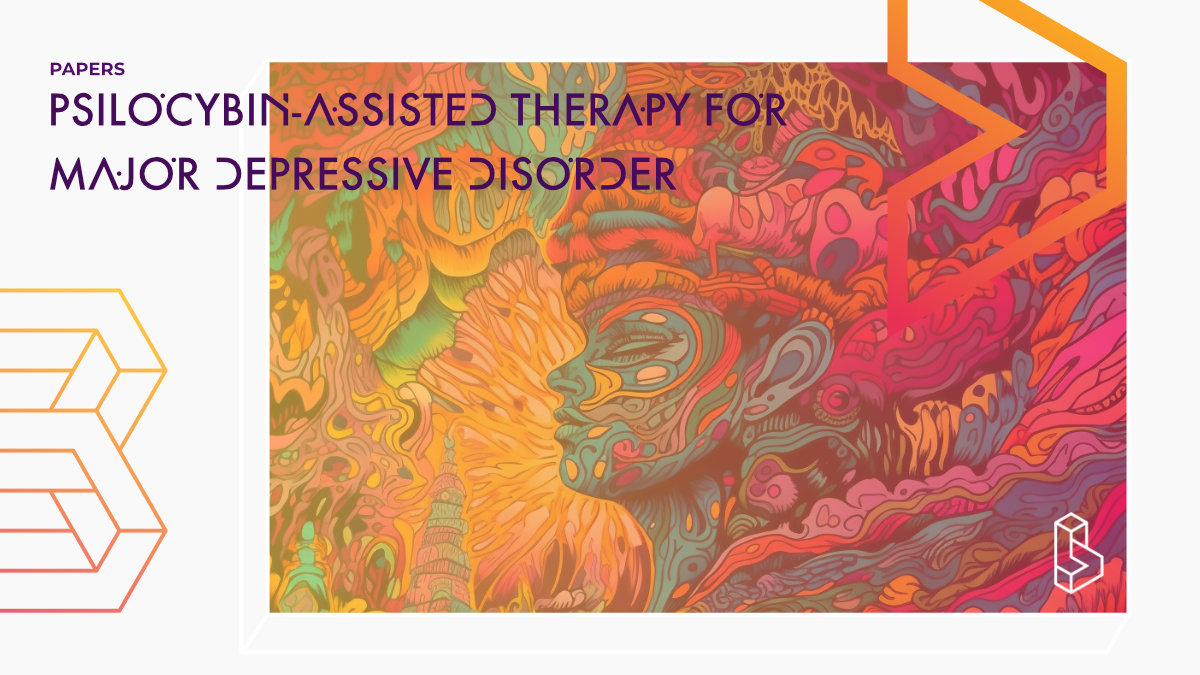This single-blind, placebo-controlled study (n=19) of psilocybin (21mg/70kg) in combination with therapy (ACT, 8x) finds an improvement in depression scores. However, the difference between the psilocybin and placebo groups was insignificant. Though the study tried to control for expectancy (placebo) effects, participants (80%) correctly guessed if they received psilocybin.
Abstract of Psilocybin-assisted therapy for major depressive disorder
“Background: Several early phase studies have demonstrated that psilocybin-assisted therapy has rapid-acting and persisting antidepressant effects from just one or two doses. However, methodological limitations (e.g., placebo-control, blinding) limit interpretability of the existing literature.
Methods: In an exploratory placebo-controlled, within-subject, fixed-order study, individuals with moderate to severe major depressive disorder were administered placebo (n = 19) followed by psilocybin (0.3 mg/kg) (n = 15) 4 weeks later. Dosing sessions were embedded within an manualized course of psychotherapy. Enhanced blinding procedures were used. Depression, anxiety, and quality of life were measured over a 16-week study period.
Results: Depression and anxiety significantly improved following both placebo and psilocybin with no significant difference in the degree of change between the two conditions. However, antidepressant effect sizes were larger after psilocybin (d′ = 1.02–2.27) than after placebo (d′ = 0.65–0.99) and there were high rates of response (66.7%) and remission (46.7%) following psilocybin administration. Antidepressant effects following psilocybin persisted, on average, for 2 months and there were persisting improvements in mood-related quality of life domains. The strength of mystical-type experience during psilocybin dosing was not correlated with subsequent antidepressant effects.
Conclusions: The results of this exploratory study highlight the complex interplay between expectancy, therapy effects, and drug/placebo effects in psychedelic-assisted psychotherapy studies. Nonetheless, the acute and persisting clinical improvements observed following psilocybin support further study of its potential in the treatment of major depression. Future studies should more explicitly mitigate and measure expectancy effects and assess the impact of repeated dosing and different forms of psychotherapeutic support.”
Authors: Jordan Sloshower, Patrick D. Skosnik, Hamideh Safi-Aghdam, Surbhi Pathania, Shariful Syed, Brian Pittman & Deepak C. D’Souza
Summary of Psilocybin-assisted therapy for major depressive disorder
Psilocybin, a naturally occurring alkaloid found in the Psilocybe genus of mushrooms, is categorized as a “classical psychedelic” compound and produces a range of acute perceptual and mood alterations in humans.
Several early-phase trials have suggested that psilocybin-assisted psychotherapy may have rapid-acting and long-lasting therapeutic effects in depressive disorders. These trials include two randomized controlled trials (RCTs) in cancer patients with depression and anxiety, and two open-label studies investigating psilocybin with psychological support as a treatment for major depression.
Find this paper
https://doi.org/10.1177/02698811231154852
Paywall | Google Scholar | Backup | 🕊
Cite this paper (APA)
Sloshower, J., Skosnik, P. D., Safi-Aghdam, H., Pathania, S., Syed, S., Pittman, B., & D’Souza, D. C. (2023). Psilocybin-assisted therapy for major depressive disorder: An exploratory placebo-controlled, fixed-order trial. Journal of Psychopharmacology, 02698811231154852.
Study details
Compounds studied
Psilocybin
Placebo
Topics studied
Depression
Treatment-Resistant Depression
Study characteristics
Original
Placebo-Controlled
Single-Blind
Within-Subject
Participants
19
Humans
Authors
Authors associated with this publication with profiles on Blossom
Jordan SloshowerJordan Sloshower is a research fellow in addiction psychiatry at Yale University. His research and clinical interests focus on therapeutic applications of psychedelic substances and he is currently an investigator and therapist in two clinical trials of psilocybin-assisted therapy in the treatment of major depressive disorder (MDD).
Institutes
Institutes associated with this publication
Yale UniversityThe Yale Psychedelic Science Group was established in 2016.
Compound Details
The psychedelics given at which dose and how many times
Psilocybin 21 mg | 1xLinked Research Papers
Notable research papers that build on or are influenced by this paper
Sub-acute effects of psilocybin on EEG correlates of neural plasticity in major depression: Relationship to symptomsThis double-blind, placebo-controlled, within-subject study (n=19) involved individuals with major depressive disorder (MDD). It investigated the effects of a single dose of psilocybin on electroencephalographic (EEG) correlates of neuroplasticity and depression symptoms. The results showed that EEG theta power doubled in amplitude two weeks after psilocybin administration. This increase was correlated with improvements in depression symptoms, suggesting that psilocybin may produce sustained changes in brain neuroplasticity and have antidepressant effects. Note that the improvement in depression scores was not significant vs placebo.
Linked Clinical Trial
Psilocybin - Induced Neuroplasticity in the Treatment of Major Depressive DisorderThe primary goal of this pilot study is to investigate whether psilocybin alters neuroplasticity in people with major depressive disorder. The primary hypothesis is that psilocybin will result in neuroplastic changes that parallel improvement in symptoms of depression.

